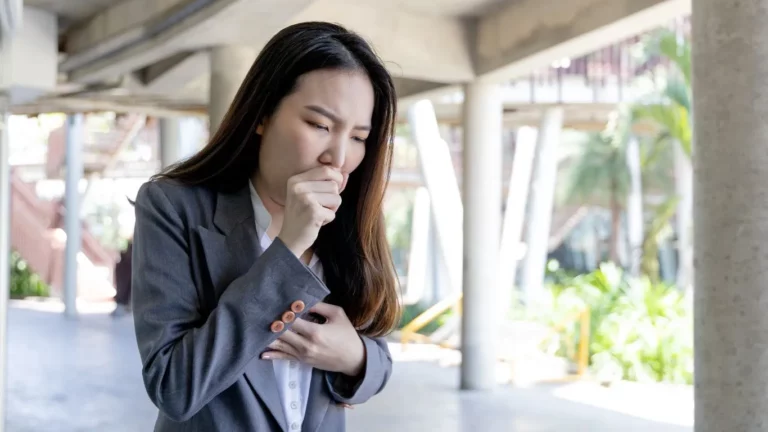Why Can Asthma Cause Dry Burning Cough? What You Need to Know
Can asthma cause dry burning cough? That’s actually a question I’ve been asked more times than I can count in the clinic, and honestly, I totally get why. It can feel confusing when you’re dealing with that nagging, scratchy, almost burning cough that won’t go away—especially when your lungs otherwise feel fine. As a pulmonary nurse practitioner, I’ve seen this symptom sneak up on patients who had no idea it could be linked to asthma. Let’s unpack this a bit and look at how asthma can show up in ways we don’t always expect.
When Asthma Doesn’t Look Like Asthma

What Exactly Is a Dry Burning Cough?
Before we jump into the asthma connection, let’s talk about the cough itself. A dry burning cough is, quite literally, a cough that feels like it’s scraping your throat or upper chest. There’s no mucus, no phlegm—just that persistent tickle or burn. It often gets worse at night or when you’re talking a lot, laughing, or breathing in cold air. Not fun.
Now, here’s the kicker: this kind of cough is often overlooked as a potential asthma symptom because people usually expect wheezing or shortness of breath. But asthma has many faces.
Asthma 101 (Quick Refresher)
Just to lay some groundwork—asthma is a chronic condition that causes inflammation and narrowing in the airways. When those airways get irritated, they become twitchy and overreactive. Triggers like allergens, cold air, exercise, or even stress can set things off. And while yes, wheezing is common, not everyone experiences it. In fact, for some people, a cough is the only sign.
- Cough-variant asthma (CVA) is a real thing
- Dry cough is often the only symptom
- It can feel like your lungs are irritated, but there’s no congestion
- Most common at night or early morning
Can Asthma Cause Dry Burning Cough? Yes—And Here’s Why

I remember one patient—a healthy, active young woman—who came in because she couldn’t shake a dry, burning cough. She’d tried allergy meds, lozenges, even went dairy-free thinking it was post-nasal drip. Turns out, she had undiagnosed cough-variant asthma. Once we started her on a low-dose inhaled corticosteroid, her cough improved within days.
This is how asthma can fly under the radar. The airways are inflamed and hyperresponsive, but instead of clamping down into full-blown wheezing or chest tightness, they just cough. And that cough gets worse when you’re exposed to common asthma triggers:
- Cold or dry air
- Strong smells or perfumes
- Exercise (especially in cold weather)
- Dust, pet dander, or pollen
- Viral infections—even long after the illness is gone
The Science Behind the Burn
Here’s where it gets interesting (and a bit nerdy—in a good way): when the airway linings are inflamed, the nerves in those linings become hypersensitive. They start sending signals to your brain that trigger coughing—even if there’s no mucus to clear out. That burning sensation? It’s your inflamed airways talking back. Think of it like road rash inside your lungs. Painful, irritating, and hard to ignore.
Why This Matters for Diagnosis

From a clinical standpoint, dry burning cough often leads people to chase the wrong diagnosis. They try acid reflux meds, allergy shots, even antibiotics—but nothing works. That’s when we need to consider asthma, especially if the cough lasts longer than 8 weeks and worsens with known triggers. It’s one of the reasons I always ask my patients:
- Do you notice your cough more at night?
- Does exercise ever trigger your symptoms?
- Have you ever had wheezing, even occasionally?
Even if the answers aren’t crystal clear, a simple spirometry test or a trial of inhaled corticosteroids can often tell us more.
Diagnosing That Mysterious Dry Burning Cough

So you’re coughing, it’s dry, it burns, and nothing seems to help. If this is hitting close to home, you’re not alone. In my experience, it often takes a few missed diagnoses and frustrated appointments before we even think about asthma as the culprit. The problem is, when the cough doesn’t sound “classic,” it gets dismissed as something else—like allergies, reflux, or even stress. But that’s where digging deeper makes a real difference.
Can asthma cause dry burning cough? Absolutely. But we have to be intentional about identifying it. Here’s how we typically sort that out in the clinic:
- History & Triggers: When does the cough happen? At night? After exercise? Around certain smells or cold air?
- Spirometry: This breathing test shows how well your lungs are moving air. It can flag airway narrowing, even if you’re not wheezing.
- Bronchodilator Response: Sometimes we do spirometry before and after using an inhaler to see if there’s improvement. That change can confirm asthma.
- Trial of Treatment: If your symptoms line up, we may start you on an inhaled corticosteroid or rescue inhaler. Improvement in your cough? That’s a huge clue.
I can’t tell you how many patients have come back saying, “Wow, I didn’t realize how bad the cough was until it started going away.” That’s a moment I always love seeing. Relief feels good—but so does finally getting some answers.
What Makes the Cough “Burn”?

Let’s get into the nitty gritty for a second. The reason your cough feels like it’s burning actually has to do with nerve endings in your airways. When those passages get inflamed—like they do in asthma—those nerves become extra sensitive. They misfire. You breathe in something mildly irritating like cold air or dust, and boom—you’re hacking away like you just swallowed a porcupine.
It’s not just irritation, it’s nerve hypersensitivity. That’s also why over-the-counter cough suppressants often don’t do much. They treat the symptom, but not the root cause. I’ve had patients who were guzzling cough syrup for months with no relief—until we treated the underlying inflammation.
Other Conditions That Can Mimic Asthma
One of the trickiest parts of my job is ruling out other causes of dry cough. Especially when patients ask things like, “Could this be reflux?” or “Is it just allergies?” And fair enough—those are valid questions.
Here’s a quick breakdown of other common culprits and how they stack up:
- GERD (Acid Reflux): Often worse after meals or when lying down. May come with heartburn or sour taste in the mouth.
- Post-nasal Drip: Usually feels like mucus dripping down the back of the throat. Throat clearing and runny nose often included.
- Upper Respiratory Infections: Viral coughs can linger for weeks but usually improve slowly without inhalers.
- Allergies: May come with sneezing, itchy eyes, or seasonal patterns.
That’s where a thorough assessment matters. If a patient tells me they’ve already tried reflux meds, allergy sprays, and humidifiers, and still have a dry burning cough—my internal radar starts pointing toward asthma.
How We Manage Cough-Variant Asthma

Once we identify asthma as the likely cause, treatment usually includes a combination of approaches. It’s not a one-size-fits-all thing, but there are some consistent pieces we start with:
1. Inhaled Corticosteroids (ICS)
This is the gold standard for asthma—especially when the main symptom is cough. It reduces airway inflammation over time, but it’s not an instant fix. I always tell patients: give it a couple of weeks. Your cough might even feel a little worse before it gets better.
2. Rescue Inhalers
Albuterol or similar bronchodilators can be helpful when symptoms flare up, especially after triggers like cold air or exercise. These are more of a short-term fix, but they offer fast relief when you need it most.
3. Lifestyle Adjustments
This is where patient education comes in big. We look at:
- Minimizing exposure to triggers (dust, smoke, perfume, etc.)
- Using air purifiers or HEPA filters at home
- Warming the air before exercising outside
- Tracking symptoms with a peak flow meter or app
Every case is a little different. I always try to tailor the treatment plan to the patient’s daily life and preferences—because let’s face it, no one wants to carry an inhaler 24/7 if they don’t have to.
We’re starting to understand that can asthma cause dry burning cough? isn’t just a yes-or-no question—it’s a whole conversation. And honestly, that’s what makes my work meaningful. Helping people connect the dots and feel heard? That’s the good stuff.
How to Keep That Dry Burning Cough from Coming Back

Now that we’ve covered what causes the dry burning cough and how asthma plays into it, let’s talk about keeping it at bay. Because once you’ve had this type of cough, you know just how frustrating it is. I’ve had patients tell me they’re afraid to laugh or even walk outside in the cold. That’s no way to live. The good news? With the right routine and tools, you can take control of it—rather than letting it control you.
Daily Management Strategies That Actually Work
Here’s what I usually recommend to my patients who’ve been diagnosed with cough-variant asthma or suspect asthma is behind their mystery cough. And no, it’s not all medication. It’s a combination of little habits and smart changes that really make the difference.
- Stick to your inhaler schedule – I always stress this one. Skipping your controller inhaler just because you “feel fine” is like skipping sunscreen because it’s cloudy. Inflammation doesn’t always announce itself.
- Identify your triggers – Keep a journal for a week. Log when the cough flares up. Patterns will usually start to appear—cold mornings, scented candles, workouts. Knowing your triggers is half the battle.
- Stay hydrated – Sounds simple, but dry airways are unhappy airways. Drinking water consistently can help soothe that scratchy sensation.
- Use a humidifier (especially in winter) – Dry indoor air can make the burning sensation worse. I recommend a cool-mist humidifier—just make sure to clean it often to avoid mold.
- Do breathing exercises – Things like pursed-lip breathing or diaphragmatic breathing can help keep your airways open and reduce overall stress on your lungs.
I’ve had several patients come back and say, “I started tracking my cough and realized it always got worse after vacuuming.” Turns out, dust was the culprit. A simple HEPA filter vacuum made a huge difference. It’s those little insights that build confidence and relief.
Can Asthma Cause Dry Burning Cough in Kids and Teens?

Absolutely. And honestly, it’s even trickier to catch in kids. They don’t always describe what they’re feeling very clearly. One of the moms I worked with thought her 9-year-old son was faking a cough to get out of gym class. After we dug into it, it turned out he had cough-variant asthma triggered by cold air and physical activity. Once he started on an inhaler and warmed up properly before recess, the “fake” cough disappeared.
If your child has a dry, persistent cough that worsens with play, at night, or in cold air—definitely worth talking to your pediatrician or a specialist. Early treatment can prevent a lot of unnecessary struggle later.
When to See a Specialist
Here’s the thing—I always encourage folks to advocate for themselves. If you’ve had a cough that’s lasted more than 8 weeks, or if it keeps coming back with the same triggers, ask your provider to consider asthma—even if you don’t wheeze. Especially if you’ve tried all the usual suspects (reflux meds, allergy sprays, etc.) with no luck.
Seeing a pulmonologist can help you get a more complete picture. They might run advanced tests like a methacholine challenge or FeNO testing, which can detect airway inflammation more precisely. You deserve clarity—and relief.
References
Disclaimer
This article is for informational purposes only and is not a substitute for professional medical advice, diagnosis, or treatment. Always consult your healthcare provider before making changes to your asthma treatment plan or if you have concerns about a persistent cough. The insights shared here are based on my professional experience as a pulmonary nurse practitioner and should be interpreted within that context.

Bianca Nala is a compassionate Nurse Practitioner with a strong background in primary and respiratory care. As a health writer for Healthusias.com, she combines her clinical expertise with a talent for clear, relatable storytelling to help readers better understand their health. Bianca focuses on topics like asthma, COPD, chronic cough, and overall lung health, aiming to simplify complex medical topics without losing accuracy. Whether she’s treating patients or writing articles, Bianca is driven by a single goal: making quality healthcare knowledge accessible to everyone.






